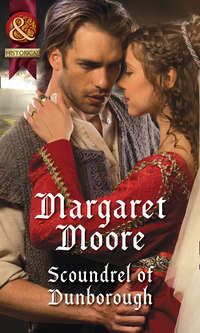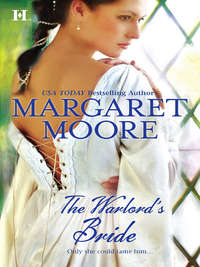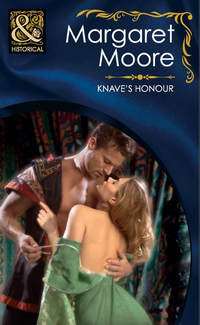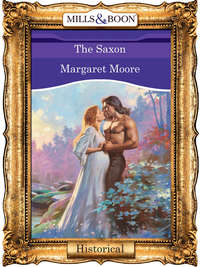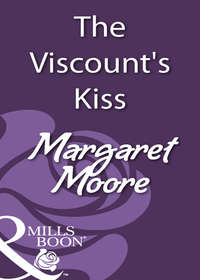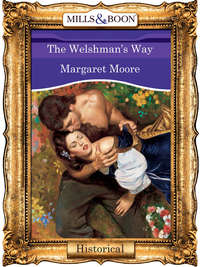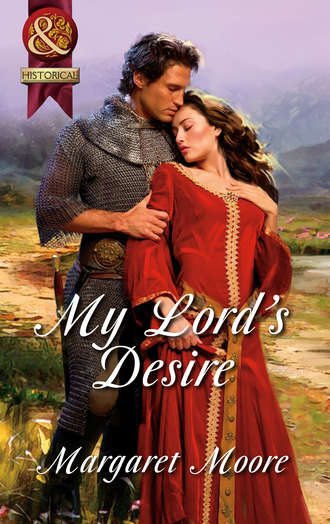
Полная версия
My Lord's Desire
Armand caught sight of Godwin and Bert, and inclined his head in a greeting. The soldiers grinned and tugged their forelocks in return.
The priest, an elderly, pinched-faced fellow with a fringe of white hair, said a grace that was notable for its pleas for God’s mercy in these terrible times. As Armand said his amen, he reflected that with such a king, asking for God’s mercy was no doubt a wise precaution.
“There seems to be a bevy of unmarried ladies here,” Armand observed as they took their seats. He nodded at one of the noblewomen sitting opposite them, closer to the king. Her long features struck him as unfortunately reminiscent of a horse. “Who is she?”
The young lady caught him looking and giggled and blushed as she whispered to another young woman beside her. That lady met Armand’s gaze quite brazenly.
God help him, how could he have forgotten what life at court was like? The games of love, the little intrigues. The suspicions. The jealousies.
Forgotten or not, he needed a richly dowered wife, so he had to play these games. He raised a goblet in salute and said, through clenched teeth, “Well, Randall? Who is she?”
“That’s Lady Mary de Chearney, and the blond woman beside her is Lady Wilhemina of Werton,” Randall answered. “I believe both have dowries large enough to pay Bayard’s ransom thrice over, but I’ve heard Lady Mary’s father has his eye on a Scots earl for her, and I think Lady Wilhemina’s brother plans to marry her off to a very rich, very old Welsh nobleman with several estates in the March.”
Relief filled Armand, and then annoyance. He mustn’t think of his own pleasure when it came to marriage. He must remember Bayard, languishing in a dungeon until his ransom could be paid.
Shyly sliding Armand a glance and a smile, a maidservant placed a platter of fine white bread before them. Armand took out his eating knife and cut off the heel of the loaf. Let others praise the roasted meats and exquisite sauces to come, the pottages spiced with herbs from far-off lands and puddings made of rare ingredients. As he’d sat in that dungeon, it had been bread he’d missed. He’d dreamed of having a whole loaf to himself, washed down with honest English ale.
The maid’s smile reminded him of another appetite that hadn’t been whetted since his release. He’d not had the energy for some time, and lately, all his efforts had gone to raising the money to free his brother. Nor had he met a woman who stirred his desire—until Lady Adelaide.
His gaze drifted toward that lady, sitting serenely beside the king. Had she been acting a part in the stable, trying to attract his interest before she learned who he was? Or had she been acting in the garden, when she had made sport of his appearance?
Randall cleared his throat as another servant set down the trenchers of slightly stale bread that would be used as plates. Later, when they had been soaked with the gravy and sauces, they would either be fed to the hounds, or given to the poor waiting at the castle gates. “I think Lady Eloise would be your best choice for a wife. Her dowry should be enough, and she’s a very sweet girl.”
Had there ever been a better friend? “Bayard wouldn’t want your happiness to be part of his ransom.”
“Oh, I have no interest in her that way.”
Armand gave Randall a look that told him exactly what he thought of that response.
His friend sighed as he took a piece of bread for himself. “What does it matter if I like her or not? She won’t want a cripple.”
“If that’s all she sees when she looks at you, then she’s not worthy of you.”
Randall tossed his bread to one of the waiting hounds. “You don’t know her. She’s the kindest, most amiable lady at court.”
Armand’s brows rose. “Am I looking at a man in love?”
When Randall didn’t answer, Armand knew the truth, and it made him feel…strange. It was as if Randall, who was usually the one left behind, had ventured into a foreign land without him. “If you care for her that much, you should ask for her.”
Randall’s lips thinned into a stubborn line. “I may not be a mighty warrior, but I do have my pride.”
“You fear her family will reject you?”
“I’m afraid she might.”
The minstrels struck up a cheerful tune, and more servants arrived bearing roasted venison, beef, eels soaked in ale and a thick pottage made of liver and kidneys, leeks and bread crumbs. Armand cut himself a slice of beef and put it on his trencher. The pottage he would not have. Although it smelled good and was likely tasty, the look of it reminded him too much of the slop he’d been fed in that cell. “So you haven’t told Lady Eloise how you feel?”
“I’ve hardly spoken to her at all.”
Armand paused with a piece of roasted beef halfway to his mouth. “Then how can you be so certain of your feelings?”
“I just am,” Randall said as he ladled some of the pottage onto his trencher, speaking with a conviction that took Armand aback.
Randall pointed to his chest. “I feel it in my heart. I fell in love with her the moment I saw her.”
Before today, Armand would have said such a thing was impossible, or a happy delusion at best. But then he’d walked into a stable and discovered a woman with a kitten clinging to her back. A beautiful woman who looked at him with the most amazing eyes he’d ever seen, a few tendrils of hair encircling her perfect features, her lips parted as if begging for his kiss. She’d made his heart race and a vitality he hadn’t felt in months rip through his body.
He forced his attention back to Randall’s dilemma as a second course of duck stuffed with a mixture of eggs, currants, apples and cloves arrived, as well as roasted chicken filled with bread and onion and spiced with rosemary and sage. A carafe of thick gravy accompanied both, and Armand was liberal in its use. “What of Lady Eloise’s family? Perhaps if you were to approach them first…?”
“Lady Eloise has no family. She’s one of the king’s wards, so he’ll decide who she marries. Unfortunately, I have nothing to offer John for the privilege.”
Armand was well aware that the king accepted bribes for the bestowing of a bride, as well as for the guardianship of young male heirs whose estates could be picked clean before they came of age. “Did your father not provide you with money before you came to court?”
“Some, but what I had is gone.”
Armand stopped eating as a terrible thought seized him. “You didn’t use any of your own money for my ransom, did you?”
“A little,” Randall admitted.
Armand swore under his breath. “I’ll pay you back. Every ha’penny.”
“I know you will.”
His appetite gone, Armand muttered, “I should have surrendered to the French the first week. I should have realized that after what happened with Arthur and the men at Corfe, the French would show no mercy. We should have fled the castle when we could, and given up without a fight.”
“Don’t blame yourself for what happened, Armand,” Randall said. “You followed the orders of the king as best you—or any decent man—could.”
Armand surveyed the finely dressed men sitting in the Earl of Pembroke’s hall, eating his food and drinking his wine. One or two, like that dark-haired, bearded fellow, he didn’t know. A few had fought in Normandy; most had not, preferring to pay a scutage instead. Lording over them all was the king, lascivious and going to fat, his face glistening with grease from the duck and roasted goose on his trencher.
To think that he had done his duty to maintain such a king and such a court.
The very least John could do was give him a rich wife.
ADELAIDE would rather have been nearly anywhere than sitting on the dais beside King John. She could take some comfort from the fact that the king bathed more often than many a nobleman, but that was the best thing she could say about him.
She looked down the hall at Eloise, seated at the far end of a table and wedged between Lady Jane and her querulous, elderly mother.
Lucky Eloise. Lady Jane talked whether one listened or replied, and her mother was interested mainly in her food. You could eat and think without having to participate in any conversation; it was as close to being alone in the hall as it was possible to be.
“So, my lady, another bold knight has come to court and no doubt will be seeking a smile from your pretty lips,” the king remarked. “What do you think of Lord Armand? A handsome fellow, is he not?”
Adelaide’s every sense was suddenly on alert, as if alarm bells were pealing from the watchtowers. It wasn’t like the king to compliment another man.
“If one prefers that sort of rugged charm,” she replied, giving the king a slight smile and pretending that the jugglers who were keeping a series of brightly painted wooden balls in the air and passing them back and forth were distracting her.
“Do you, my lady?” the king pressed.
She had to turn to him then and she encountered a searching gaze that made the sweat start to trickle down her back.
In spite of her discomfort, she let her smile grow and willed her eyes to tell John that there was no one more interesting, important or fascinating than he. That would be an unspoken lie; what came from her lips, however, was the truth. “I find myself wishing to do something about his hair and find him garments more appropriate to your court, sire.”
She did want to do something with Lord Armand’s hair. She wanted to touch it. She longed to run her fingers through the unruly waves and comb it back from his handsome face. And although she should have been paying close attention to the king and his queen to ensure she made no misstep in either look or speech during the meal, she’d been imagining Armand de Boisbaston attired in garments more appropriate to the court—rich fabrics cut to accent his magnificent, well-muscled body. She’d spent the better part of the first two courses trying to decide if he’d look better in scarlet or in blue.
“Even so poorly dressed, he is a fine-looking man, is he not?” the young queen interjected with a cunning smile as the final course arrived at the table, a meat pie of rabbit and pork colored with saffron and spiced with cinnamon.
Adelaide gave the queen a smile. She didn’t like the spoiled, often petulant girl, but at least Isabel was no Eleanor of Aquitaine. Isabel had very little power at court; John even took the Queen’s Gold for his own use, something the awe-inspiring Eleanor would never have allowed.
“If one considers personal attraction to lie solely within outward appearance,” Adelaide replied. “Many women prefer a man of learning and intellect.”
Adelaide knew well that John considered himself a learned man. In many ways, he was, and had he been trained to a career in the law. Adelaide had sometimes thought, he might have been a worthy attorney. Sadly, his interest in the law, like so much else in him, had been corrupted by greed and ambition.
“They say Lord Armand is quite learned, too,” the queen noted. “He speaks Latin like a Roman, or a cleric.”
“You seem to know a good deal about him, Your Majesty,” Adelaide placidly observed.
The king cut his wife a glance. “Yes, you do.”
“It is my duty to know all about the men who have sworn their oath of loyalty to you, my husband,” the queen calmly replied.
John made no answer, but it was plainer than words that he was annoyed. He might treat his vows of marital fidelity lightly and expect the wives and daughters of his noblemen to be eager for his bed, but when it came to his queen, it was quite a different matter.
“I suppose he will be asking for money,” the queen said, “as if he should be rewarded for losing Marchant.”
The king sniffed. “He is welcome to ask.”
Adelaide bunched her linen napkin into a ball on her lap. It was no wonder the king’s barons loathed him. He seemed to treat their loyalty and risks on his behalf as no more than his due. He made light of their sacrifices, and demanded bribes and payment for what he should bestow as justly earned rewards. He ignored the rules of chivalry, and many believed he’d killed his own nephew with his bare hands. Even if he hadn’t, Arthur had certainly disappeared and was very likely dead.
Her appetite quite gone, Adelaide glanced at the king’s plump, bejewelled fingers. Were they capable of squeezing a boy’s throat until he died?
If he could order a boy blinded and castrated to prevent him taking the throne, what would he not do?
She couldn’t suppress the shiver that ran down her back. And to think this man had the power to compel her to go to his bed, if he chose to use it.
“My lady is cold?” the king asked, leaning closer.
It was all Adelaide could do not to shy away. “There must be a draft.”
“Perhaps dancing will warm you.”
The thought of touching John made her feel ill—and she found her excuse. She put her hand to her head and gave him a woeful smile. “I feel a little unwell, Majesty. I believe I had best retire.”
The king frowned, but mercifully didn’t command her to stay. “Very well. We hope that you’ll be feeling better tomorrow.”
Adelaide bowed her head and said no more as she left the dais. Sensing the eyes of the other courtiers upon her, she knew they were wondering if she’d already shared the king’s bed. She had heard that wagers had been made, and those who believed the king hadn’t yet succeeded had placed bets on when he would.
Despite the secret anguish that speculation brought her, she held her head high and her lithesome back was as straight as a barge pole. She was Lady Adelaide D’Averette, and she would never willingly submit to any man’s domination.
Not even the king’s.
CHAPTER FOUR
“SO I DECIDED to use the excuse of an aching head to take my leave of the king,” Adelaide said as she strolled beside Eloise in the garden after breaking the fast the next morning.
The day was warm and sunny, with a light breeze that stirred the leaves of the vines and made the red and white roses nod. In a lovely light blue gown trimmed with delicately embroidered green leaves and with her blue silken veil floating about her face, Eloise looked like the very spirit of summer. Adelaide was more plainly dressed, as befitted her supposed lack of fortune, in a gown of russet wool, with only a simple leather girdle around her waist.
“I also told Sir Oliver I was feeling a little ill this morning when he asked me if I was joining the hunt,” she said.
“I’m so relieved most of the court went,” Eloise replied. “It’s so much more peaceful and quiet when they’re hunting.”
By silent mutual agreement, they went into one of the many little alcoves and sat upon a wooden bench.
“Did you speak to Randall FitzOsbourne last night?” Adelaide asked.
Eloise flushed and studied the white rose bushes around them. “No, I didn’t get the chance.”
“Eloise…!”
“I was going to,” her friend protested, clasping her hands in her lap, “but before I could, Lord Armand asked me to join him in a round dance. It would have been rude to say no, and when we finished, Randall was gone.”
Eloise frowned and spoke with uncharacteristic bitterness. “I should have retired when you did. Lord Armand only asked me to dance because Lady Hildegard was marching toward him with a most determined look in her eye. He didn’t want to dance with her so he asked me instead.”
A sudden, silly surge of disappointment pricked Adelaide as she wondered if that was really true. She didn’t doubt that Lord Armand wanted to avoid the predatory Hildegard, but she could also believe he had an additional reason for asking Eloise to be his partner. Eloise, however, was so modest and unassuming, she was probably quite blind to a man’s genuine interest.
“Even if Hildegard was bearing down on him like an attacking knight, he didn’t have to ask you to dance,” Adelaide pointed out.
“I wish he hadn’t. He never said a word to me the entire time. And I’m quite sure asking me to dance doesn’t mean he likes me that way. After he danced with me, he asked Jane. The poor thing was so flustered, she forgot the steps and ran into Hildegard, who said something that made her burst into tears. I don’t know what Lord Armand said to Hildegard after that, but I don’t think she’ll be chasing after him again. She’ll have to content herself with Lord Richard, if she can, and I wouldn’t be overly confident of that, either, if I were her. You should have seen the way he looked at you when you left the hall last night.”
Adelaide frowned and said with all sincerity, “I truly hope John doesn’t make me marry Richard. Why, he’ll be more concerned about his boots than he’ll ever be about his wife.”
Eloise started to laugh in agreement, then glanced up at the sun above the nearest tower.
“Oh, saints preserve us, it’s nearly the noon,” she cried, jumping to her feet. “Marguerite should have returned with my clean shifts by now. Pardon me, Adelaide, but I must see if they’re all right. The last time she did the washing, two of them were torn.”
With that, Eloise gathered up her skirts and rushed away toward the garden gate without waiting for Adelaide to say another word.
Adelaide watched her go with a bit of relief. She hated talking about marriage. Such conversations inevitably reminded her of her parents’ unhappy union. Her father had been a harsh, overbearing tyrant who was often in his cups, and her mother had been frail and delicate, too weak to defend herself or her children when he was in a rage. As long as Adelaide could remember, her mother had been sick in body and sick with fear.
She would never forget the shock she’d felt the day she’d dared to come between them. For the first time, she’d seen a grudging admiration in her father’s eyes, and he’d never again laid a hand on her, or her mother and sisters, if she was nearby.
That day she had learned that strength need not be physical, that resolve and boldness could be strengths, too.
She’d also realized that both her parents were weak. If her father had not the law and the dictates of society to bolster his rule, and if her mother had had the determination to stand up to him, their lives might have been very different.
Approaching footsteps interrupted her unhappy thoughts. The gait was uneven, as if the person limped, like Randall FitzOsbourne.
Eloise was so shy, she might never speak to him, even though it was obvious she liked him very much. If Eloise wanted to marry—and she did as eagerly as Adelaide did not—Randall FitzOsburne was better than many a husband would be.
Prepared to do whatever she could to help her friend be happy, Adelaide left the alcove—and discovered Lord Armand de Boisbaston walking down the garden path.
As startled as she, he came to a halt a few feet away. Then he crossed his arms and leaned his weight on his left leg as he stared at her with those brown, gold-flecked eyes.
She blurted the first thing that came to mind. “I thought I heard somebody limp—I thought you were Randall FitzOsbourne.”
“Obviously, I’m not.”
She felt an almost physical pain at his brusque response, although it was no more than she deserved after what she’d said to him yesterday.
She simply couldn’t let him continue to think she was insolent and rude. “I’m sorry if I insulted you yesterday, my lord,” she said. “I was impertinent and I wouldn’t be surprised if you never wanted to speak to me again.”
Lord Armand’s brows rose.
“I doubt I can truly appreciate what you’ve endured. I should have accorded you the respect to which you’re entitled, and I deeply regret what I said.”
His body relaxed and a smile dawned upon his handsome face. She was pleased to see it, even if it sent another unwelcome thrill throbbing through her.
“In light of your apology, my lady,” he said, “I’ll tell you why I haven’t cut my hair.”
He gestured at the nearby bench and although it was rather hidden from the path, she answered his silent request and sat upon it.
He joined her and explained. “I want my appearance to remind the king that things have changed since I went to Normandy, that myself and others paid a heavy price for trying to hold his lands there. I don’t want him to be able to delude himself that everything is as it was before.”
“Now I’m even more sorry for what I said.”
“Dwell no more upon it, my lady,” Lord Armand replied, his answer like a warm blanket on a cold day. “It’s forgotten.”
Then his lips lifted in a devilish little grin and his eyes shone with merriment. “Although the notion of painting my face blue and leaping out at Francis in the dark does have a certain appeal.”
Adelaide had to smile, too. “I’d like to see that myself.”
“I gather, then, you don’t particularly care for Francis?”
She felt as if they were veering onto treacherous ground. “He’s a knight in the king’s household,” she answered carefully.
“That doesn’t mean you have to like him.”
She decided it would be better not to talk about the other men of the court. “I hope the kitten’s scratch is healing, and you suffered no lasting effects?”
“No. And you?” he asked.
“A few small scratches—nothing of consequence.” She slid a glance his way. “You left the stable rather abruptly.”
His discomfort at her observation was obvious. For a moment, she wished she hadn’t mentioned it, until he gave her a wry little grin and said, “I was embarrassed by the scars on my wrist. I’m as proud as any man, my lady, and some consider surrendering cowardice.”
“I don’t,” she truthfully replied. “What good would it do to have a knight like you dead?”
The look that came to his eyes made her heartbeat quicken, and her whole body pulse with something that could only be lust. Many men had said ridiculous things to amuse or flatter her, and to arouse this sort of sensation, she didn’t doubt. None of them ever had, yet Lord Armand had done so without a single word.
Again, a warning sounded in her mind. This time, though, it had little to do with her future, and everything to do with what she was tempted to do right then and there.
Fortunately, before her wicked impulse could triumph over her rational mind, a door banged open on the far side of the garden, followed by a burst of feminine laughter.
“Lord Aaarrr-mand!” Hildegard called out, sounding as if she’d been sharing a cask of wine with someone. “Come out, come out, wherever you are, or you’re going to have to pay a forfeit for abandoning us!”
Lord Armand grimaced. “God’s blood, I thought I’d gotten clean away.”
Adelaide knew exactly how he felt. “Come with me, my lord,” she said, rising and taking his hand in hers. “There’s a little hut at the far corner of the garden where the servants keep their tools. It’s well hidden behind some climbing roses.”
He made no objection, and as they hurried down the path, she noticed that he favored his left leg.
“Here,” she said, a little out of breath as they reached the wooden building. She pulled open the door and ushered him inside. “If they come this way, I’ll tell them I haven’t seen you.”
“You’d lie for me?”
“To Hildegard, I would.”
He was about to close the door when they heard other voices close by. It was the king and his companions, obviously back from the hunt.
“God’s teeth!” Adelaide muttered under her breath. She didn’t want to see them any more than Lord Armand wished to converse with Hildegard.
Without a word, Lord Armand yanked her into the hut and closed the door. The building was hot and stuffy and smelled of damp earth, but that wasn’t why Adelaide found herself breathing rapidly, and she knew it.
Lord Armand was close, much too close, in this dark, confined space. She could hear his breathing and feel the heat from his body as he stood behind her. She could sense his powerful muscles held in check as he, too, tensely waited. She could discern the scent of his warrior’s body, of the soap he used to soften his whiskers before he shaved his jaw clean, of his woollen clothes and leather belt and boots.


